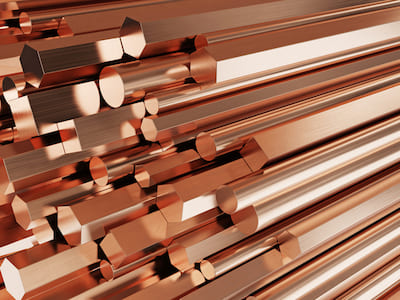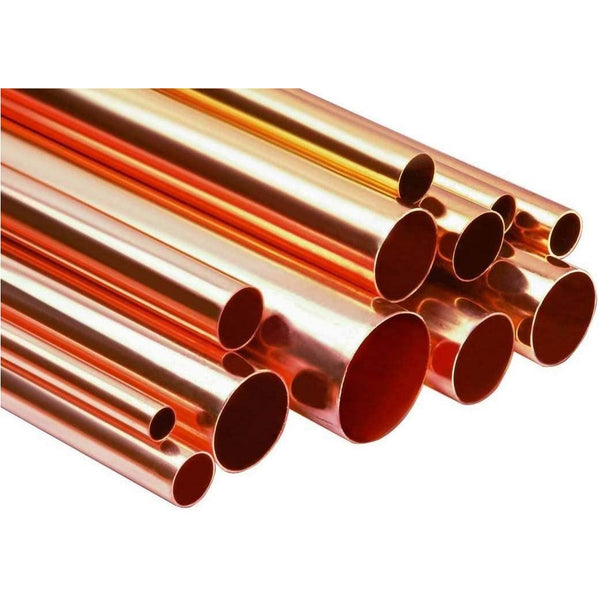Exactly How Copper Products Add To Sustainable Practices in Numerous Markets
In renewable power systems, for example, copper enhances the performance of solar and wind modern technologies, while its application in building and construction lessens waste via long life. As industries seek to embrace more lasting practices, the duty of copper can prove crucial in achieving environmental objectives.
Copper in Renewable Power
Copper plays a vital duty in the improvement of renewable energy innovations, functioning as an important conductor in various applications. Its exceptional electric conductivity and resistance to deterioration make it a perfect product for electric wiring, which is essential in solar panels, wind turbines, and energy storage space systems. In solar photovoltaic systems, copper is made use of in the affiliations and circuitry, enabling effective power conversion from sunlight to electrical power.
In wind energy, copper is important to the generators and transformers that convert kinetic power right into electrical power, ensuring optimum performance and reliability. The need for electrical automobiles (EVs) is enhancing, with copper being a crucial part in batteries, electric motors, and billing infrastructure. The transition to EVs considerably boosts the need for copper, as these cars generally utilize 4 times a lot more copper than traditional inner burning engine vehicles.
As the globe seeks to mitigate environment modification and transition to lasting power sources, copper's function comes to be significantly vital. The material not just boosts the performance and durability of renewable resource systems however likewise supports the broader objective of minimizing greenhouse gas emissions and promoting a sustainable future.
Eco-Friendly Building And Construction Products
In the last few years, there has actually been a remarkable change towards the fostering of green building and construction products in response to growing ecological worries. This change is encouraged by the requirement for lasting alternatives that minimize environmental footprints while keeping structural integrity and aesthetic charm.
Copper, known for its resilience and recyclability, has emerged as a principal in this field. It can be utilized in roof, plumbing, and electric systems, adding to power effectiveness and lowering waste. Copper's longevity means fewer substitutes gradually, further enhancing its sustainability profile.
In addition, materials such as bamboo, redeemed timber, and reused steel are getting appeal. These alternatives not only offer decreased environmental impact however also promote source preservation. As building codes significantly stress sustainability, architects and home builders are incorporating these products into their projects, cultivating advancement in design.
The increasing adoption of environmentally friendly building and construction materials mirrors a broader dedication to sustainability in the developed environment. By focusing on these products, the building market can dramatically decrease its carbon impact, straighten with governing standards, and support a healthier community for future generations. This trend notes a critical step in the direction of a more lasting future in building and construction.
Copper's Duty in Healthcare
Recent studies have actually highlighted the considerable function of copper in medical care setups, especially because of its antimicrobial homes. Copper surfaces have actually been revealed to minimize the presence of virus, including infections and microorganisms, by approximately 99.9% within a short duration. This impressive efficiency makes copper an invaluable product for high-touch surfaces in medical facilities, such as doorknobs, bed rails, and IV poles, therefore contributing to boosted infection control actions.
Along with its straight antimicrobial impacts, copper likewise contributes in the broader context of medical facility sustainability (Copper Products). By integrating copper into medical equipment and furnishings, healthcare facilities can webpage lower the incidence of healthcare-associated infections (HAIs), which not only boosts person end results yet likewise reduces the expenses associated with prolonged healthcare facility keeps and extra therapies
In addition, copper's longevity and recyclability align with lasting methods, permitting responsible resource management. As health care systems progressively prioritize both person safety and ecological stewardship, the integration of copper products is becoming much more prevalent. This double advantage underscores copper's crucial payment to a much healthier, safer, and more sustainable health care environment.
Sustainability in Transportation

Additionally, copper's longevity and rust resistance add to the durability of transport facilities (Copper Products). In rail systems, as an example, read this article copper elements enhance the integrity and performance of signaling and power systems, essential for reducing hold-ups and power usage. In addition, copper's duty in renewable resource systems, such as solar and wind, supports sustainable transport options by offering clean energy for electrical transportation options
Investments in copper modern technology not only foster sustainability however likewise boost financial growth and task creation in eco-friendly industries. As sectors aim to meet stringent environmental regulations, the application of copper products in transportation arises as a critical strategy in accomplishing sustainability objectives and advertising a cleaner, extra reliable future.
Copper and Round Economic Situation
As the world increasingly welcomes sustainability, the duty of copper in the round economic situation becomes ever before extra considerable. Copper's intrinsic residential properties-- such as its recyclability, resilience, and conductivity-- position it as a vital product in a resource-efficient economy. The circular economy intends to decrease waste and make the most of resource use through recycling and reusing materials, and useful content copper excels in this respect.
The steel can be reused forever without loss of high quality, making it an ideal prospect for sustainable practices throughout different industries, including building and construction, electronics, and renewable energy. By reprocessing and recouping copper from end-of-life products, sectors can dramatically lower the demand for virgin materials, thereby decreasing environmental influences related to mining and processing.
Moreover, the assimilation of copper into circular economic situation structures not only saves resources yet additionally cultivates technology. Businesses that prioritize copper reusing contribute to a much more lasting supply chain, enhancing their competitiveness while lining up with regulatory needs and consumer choices for eco responsible items.
Final Thought
Finally, copper items significantly add to sustainable techniques throughout multiple markets. Their important function in boosting renewable resource modern technologies, promoting environmentally friendly building and construction materials, sustaining infection control in medical care, facilitating sustainable transportation, and symbolizing the concepts of a round economy emphasizes the flexibility and relevance of copper. By incorporating copper into various applications, sectors can attain better efficiency, decrease ecological influence, and align with worldwide sustainability objectives, inevitably promoting a more sustainable future.

Copper's outstanding conductivity makes it a recommended product in electrical car (EV) systems, improving energy effectiveness and performance. Additionally, copper's function in eco-friendly energy systems, such as solar and wind, supports lasting transportation options by supplying tidy power for electrical transit choices.
Their important function in improving renewable energy modern technologies, advertising green construction materials, sustaining infection control in health care, facilitating sustainable transport, and symbolizing the principles of a round economic situation emphasizes the flexibility and importance of copper.